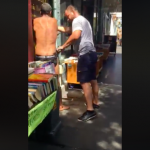Police Are Routinely Breaching Strip-Search Laws, As Well As Their Own Protocols

Section 31 of the Law Enforcement (Powers and Responsibilities) Act 2002 provides that police can carry out strip searches in the field if “the seriousness and urgency of the circumstances make the strip search necessary”.
These days, NSW police has both small tents at festivals and privacy screens at train stations set up specifically to conduct strip searches, meaning that on a daily basis they’re expecting situations that are so serious and urgent that they warrant an immediate strip search.
As SMH revealed this week, a November 2018 report by the NSW police Lessons Learnt Unit found that officers are breaching strip search protocols, as well as not properly informing individuals that they’re about to perform a such search. And this is due to the vague rules set out in the legislation.
However, if on-the-beat officers are provided with equipment such as screens to enable strip searches, it would suggest that the stipulation that this traumatising practice is only carried out in serious and urgent circumstances is being misinterpreted at the managerial level.
And the fact that the number of strip searches being conducted has increased by 47 percent over the four year period ending in June last year, would suggest the entire NSW Police Force (NSWPF) is interpreting the legislation as allowing officers to routinely order the public to strip off.
The blind leading the naked
NSW Greens MLC David Shoebridge said that police in recent years have started using strip searches as “an ordinary part of day-to-day policing”. “They build the infrastructure for it. And they clearly have protocols that see people routinely strip searched, rather than complying with the law.
“This is a failure of leadership at some of the most senior levels inside NSW police,” Mr Shoebridge told Sydney Criminal Lawyers.
The NSW Greens justice spokesperson requested the data on strip searches last November. And the stats show that between 1 July and 14 November last year, police had already made 1,913 people disrobe and 1,293 of these individuals – or 68 percent – didn’t have anything illegal on them.
And Shoebridge’s office has obtained a police code of conduct, which provides no assistance with strip searches other than repeating the laws. “There are over 100 local commands across NSW and from what we can tell, they literally make it up as they go at each and every one of them,” he added.
Traumatised over nothing
“Now when I go to an event, I feel sick when I’m waiting to get in. I know I don’t have anything on me, but it doesn’t matter,” wrote a woman in an SMH article, after she’d been strip searched with nothing found on her at a festival. “I did nothing wrong that day and I was penalised for it.”
The 22-year-old woman, who withheld her name, wrote of the humiliation she felt when she was subjected to the strip search. Indeed, it’s been shown that strip searches can traumatise individuals, or re-traumatise those who’ve been subjected to sexual assault in the past.
When this now routine procedure is carried out at train stations and events, the motivation is to discover illicit substances. However, since the 2006 Ombudsman report on drug dogs, it’s been well-known that the majority of times drugs are found, it’s small quantities of cannabis.
And it’s further recognised by authorities and the public that most people who are made to strip off don’t have anything on them. Of the 18,756 people ordered to take off their clothes by officers over the four year period ending in June 2018, 12,014 – or 64 percent – of them had no illegal items.
A routine violation
The anonymous woman recalled that as she made her way over to the line on arrival at the Sydney Olympic Park festival, a drug dog followed her. “It didn’t sit down at any stage, but the officer stopped me and said the dog had indicated that I did have something on me,” she explained.
The internal police review outlined that a positive drug dog indication is not enough by itself to constitute “reasonable grounds” to conduct a search. Therefore, the sniffer dog indication must be accompanied by other evidence – via observation, questioning or intelligence – to warrant a search.
“That’s a protocol that’s honoured in the breach,” Mr Shoebridge continued. “We know from hundreds of individual testimonies that the simple indication by a dog is all that police rely upon to not only do the initial search, but thousands of times a year escalate that up to a strip search.”
In conjunction with the NSW Young Greens, Shoebridge launched anti-drug dog campaign Sniff Off back in 2011. It’s been tracking sniffer dog figures since then, and has consistently found that two-thirds to three-quarters of the time that a dog makes a positive indication no drugs are found.
And while the NSWPF may state in writing that a drug dog indication is not enough for one of its officers to carry out a search, according to the Greens MLC, “it’s got nothing at all to do with what happens on the ground”.
A stark tipping point
The justifications behind strip searches, as well as the widespread use of drug dogs, have become increasingly unstuck. Stories of routine humiliations, as well as demands that minors remove their clothes as part of everyday procedures, isn’t sitting right in the public mind.
“I’m hopeful that as ever larger parts of the community realise the way in which police are abusing strip search powers that we will get the momentum for some statutory change,” Mr Shoebridge continued.
And this understanding is rising too amongst the judiciary. Last year, the NSW District Court awarded a man in his fifties over $112,000 after it was found in March 2015 that he’d been unlawfully made “to strip to a naked state, squat and expose his genitals” at Kings Cross police station.
“We need to have legislative intervention that limits the circumstances where police can undertake a strip search,” Shoebridge concluded, adding that this would include “clearer definitions” in law and “at a minimum, an internal reference process before individual police undertake a strip search”.







